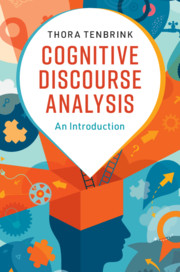Book contents
- Cognitive Discourse Analysis
- Cognitive Discourse Analysis
- Copyright page
- Contents
- Figures
- Tables
- Preface
- Acknowledgements
- Introduction
- 1 Background and Scope
- 2 Language as a Representation of Thought
- 3 Resources
- 4 Identifying Cognitive Orientation
- 5 Identifying Cognitive Depth
- 6 Identifying Cognitive Constructiveness
- 7 Using Language to Convey Thoughts
- 8 CODA Procedures
- 9 Beyond CODA
- Register of Linguistic Features
- References
- Index
2 - Language as a Representation of Thought
Published online by Cambridge University Press: 23 January 2020
- Cognitive Discourse Analysis
- Cognitive Discourse Analysis
- Copyright page
- Contents
- Figures
- Tables
- Preface
- Acknowledgements
- Introduction
- 1 Background and Scope
- 2 Language as a Representation of Thought
- 3 Resources
- 4 Identifying Cognitive Orientation
- 5 Identifying Cognitive Depth
- 6 Identifying Cognitive Constructiveness
- 7 Using Language to Convey Thoughts
- 8 CODA Procedures
- 9 Beyond CODA
- Register of Linguistic Features
- References
- Index
Summary
Chapter 2 discusses the relationship between language and thought from a methodological perspective. It explores how language has been viewed as a representation of thought, and used as a 'window' to human cognition, across various disciplines, spanning cognitive science, psycholinguistics, and other areas. In cognitive science, unconstrained verbal production data are frequently used to investigate dynamic cognitive processes, whereas psycholinguistic approaches address cognitively significant distinctions between a set of available options in controlled situations, typically with a focus on language production and comprehension. Following a general outline of other relevant disciplines and areas in which cognition is addressed through language, this chapter spells out in some detail how CODA builds on, relates to, and is distinct from both of these most central approaches.
Keywords
- Type
- Chapter
- Information
- Cognitive Discourse AnalysisAn Introduction, pp. 32 - 56Publisher: Cambridge University PressPrint publication year: 2020

